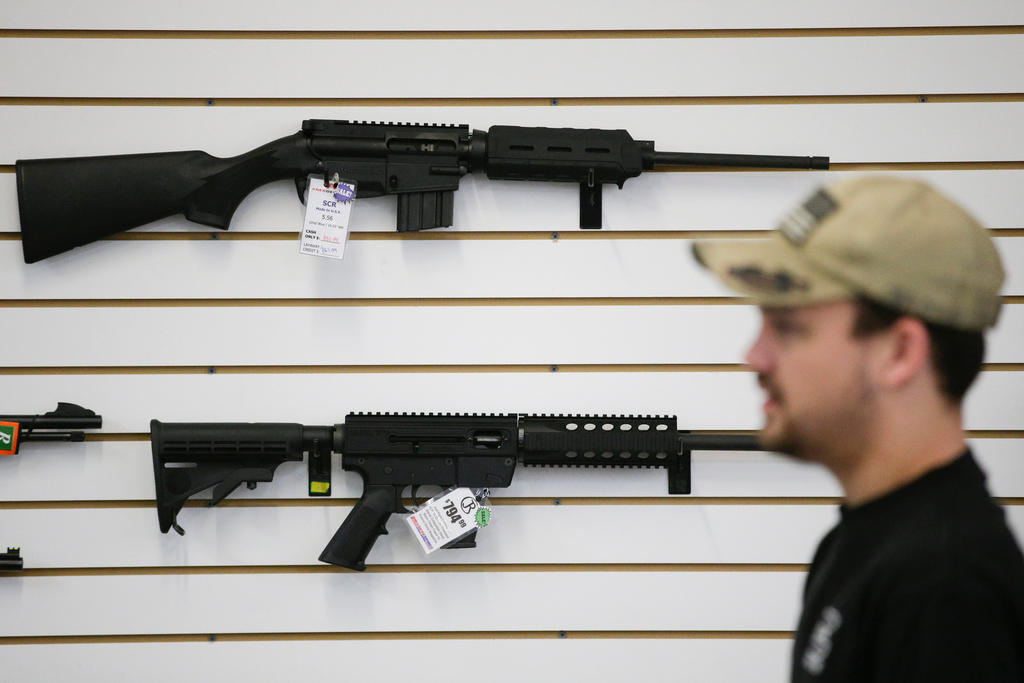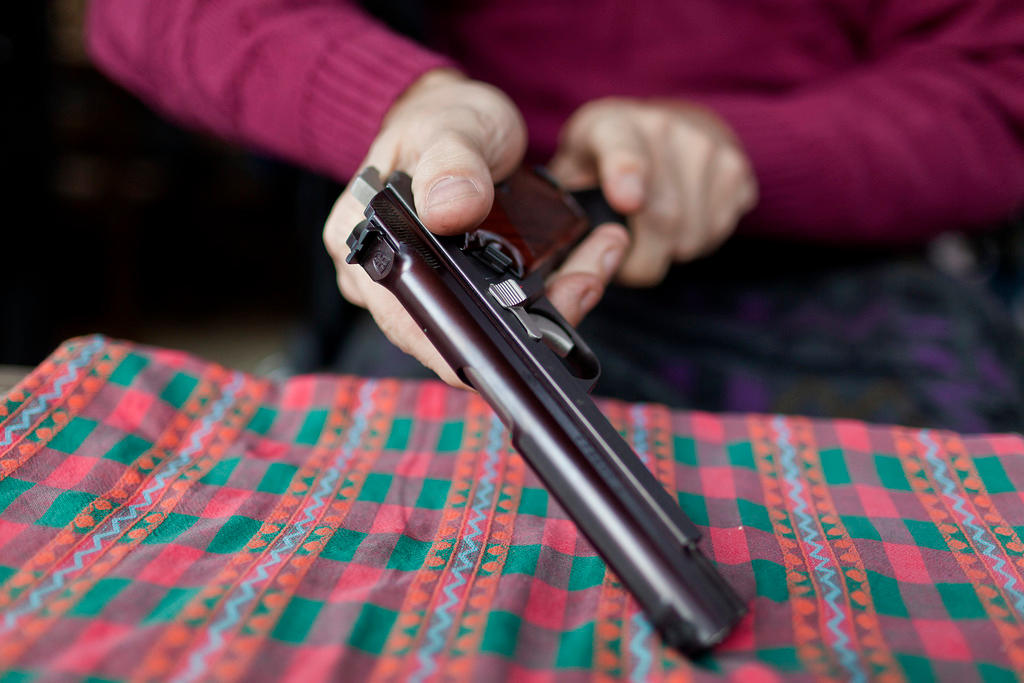How do the Swiss deal with firearms? Your questions, answered

Following recent gun law debates in the United States, many readers wanted to know more about how gun issues are handled in Switzerland. Here are answers to some of the most frequently-asked questions, including why a country with so many guns in private hands has so few mass shootings.
What kind of guns are ordinary people allowed to own? Are there any conditions or requirements they have to meet?
There’s a clear right in Swiss law for ordinary Swiss citizens to possess a gun. However, there are some requirementsExternal link that need to be fulfilled first.
Notification requirement
Certain types of firearms only have a “notification” requirement. This means you’ll need a written contract that details the person selling or transferring the weapon and the person acquiring it. Specifics of the weapon need to be included. The person transferring the weapon has to send this contract to the new holder’s cantonal authorities within 30 days.
The guns falling under this category include manual repeating firearms for sport and hunting, rabbit stunners, airsoft guns, alarm or starting pistols, paintball guns, imitation firearms, air and CO2 weapons, and certain Swiss ordnance repeating firearms.

More
Regulating firearms in gun-loving Switzerland
Licensing requirement
A licence is needed for other types of guns including pistols, revolvers and semi-automatic firearms.
You’ll have to make sure you fulfill these criteria:
- Be at least 18 years of age
- Not be subject to a deputyship or a supervision order
- Not give any cause to assume that you could harm yourself or anyone else with the weapon
- Not have a criminal record for violent or dangerous offences or repeated felonies or misdemeanours
In order to obtain such a permit, you’ll need to send the following documents to your cantonal weapons officeExternal link:
- An application form
- A copy of your criminal record certificate
- A copy of your passport or ID card
The rules are slightly different for people who live abroad or do not have a “C” residence permit, and some foreign nationalsExternal link are completely banned from acquiring or shooting guns.
What are the differences in acquiring and being allowed to own a hand gun and an automatic weapon?
In order to acquire or own a hand gun, you will need a licence (see above). Fully automatic guns are banned outside of military purposes, as are most semi-automatic guns that were once fully automatic. The list of banned weaponsExternal link for ordinary citizens also includes heavy machine guns, silencers and grenade launchers, for example.
Are there restrictions placed on people who are deemed as posing a security risk or not psychiatrically suitable to own a gun? How is this judged?
Criminologist Martin Killias, who is a permanent visiting professor at the University of St Gallen’s law school, told swissinfo.ch that the background check people have to undergo to be able to acquire a gun is “very precise”. For example, although the Swiss army has a draft system, many potential recruits are not taken because they’re considered unsuitable.
“They have to undergo a psychiatric test,” says Killias. “That test is constructed in such a way that it identifies the presence of a ‘risk’. It does not say the person is dangerous, just that they are not without risk. Then this person is not eligible to get a gun.”
In 2018, for example, there were 10,200 new recruits for military service; 53 were rejected in a pre-screening for potentially presenting a danger to themselves or others.
“There are just not that many people with access to a gun in Switzerland.”
Why are there so few mass shootings in Switzerland but so many guns in private hands?
Switzerland has had two mass shootings in the last 20 years. Killias told swissinfo.ch that what matters is “how many people have access to a gun, at home or in the office or wherever”. In Switzerland, he said, this number is just above average for Europe, once the army-issue weapons are taken out of the equation.
“There are just not that many people who have access to a gun in Switzerland,” he says. “That’s basically a big misunderstanding. Americans see Switzerland as an NRA (National Rifle Association) country, and it is not. There is a serious misconception.”
He described a number of other reasons why he thinks there are so few mass shootings in Switzerland: although soldiers take home their guns they do not receive any ammunition for them (see question below); the army has shrunk considerably in size and therefore fewer people have access to army guns; and traditional hobbies which involve guns, such as hunting or target shooting, have become considerably less popular than a few generations ago.
Killias also pointed out that automatic and semi-automatic weapons are not “generally” available.“In America there is an ideology that we do not have in Switzerland: that we need guns to defend our liberty. That is absolutely not European and not Swiss,” he added.
Do the individual cantons cooperate with each other and the federal government on laws/regulation?
Switzerland has had a federal lawExternal link since 1999 that banned specific types of guns nationwide and introduced permits for others. Up until the introduction of this national law, each canton had different rules. Today, all 26 cantons keep track of the guns held within their borders as well as the ammunition.
Cantons may authorise exceptions to certain aspects of Swiss federal weapons laws, such as the nationalities which may not own weapons and the types of weapons that may be owned.
I’ve heard that there are strict limitations on ammunition in Switzerland. Who can buy ammunition and how much can they acquire?
The Swiss weapons law places similar restrictions on purchasing ammunition as it does on purchasing guns. Namely, adults who are not under a supervision order, who do not indicate posing a danger to themselves or others and who have not committed an offence “which expresses a violent or dangerous attitude towards the public” may purchase ammunition.
How do munitions dealers check that those conditions are met? The law states that dealers of ammunition may assume the person purchasing it meets the conditions if “there is no evidence to the contrary, and if the person can produce a license for the weapon he or she is seeking ammunition for, which is no more than two years old. A valid European firearms passport is also sufficient to purchase ammunition.”
If the dealer has reason to believe that the person does not meet the legal conditions for buying ammunition, he or she must request a background check from the potential customer before making the sale.
Ammunition dealers must also check the identity and age of the customer.
The following types of ammunition are not allowed in Switzerland:
- Ammunition with hard-core projectiles;
- Ammunition with projectiles containing explosive or explosive devices
- Ammunition with projectiles for the release of substances that permanently damage human health
- Ammunition, projectiles & missiles for military launchers equipped with an explosive effect
- Ammunition with projectiles for the transmission of electric shocks
- Ammunition for hand guns with a deformation effect
There is generally no limit on the amount of legal ammunition a gun owner may acquire.
How is ammunition regulated in the army?
According to Daniel Reist, head of communications for the Swiss Army, every soldier doing target practice is issued exactly as many bullets as he or she needs for the training. If a soldier is practicing shooting in the field, returning any unused bullets is required. Army supervisors also carry out random checks where they tell soldiers to empty their bags and pockets and check for ammunition that wasn’t accounted for.
Although every soldier gets a military-issued weapon, they are not allowed to take home even a single bullet for it.
If soldiers can’t take home any bullets, then why are army weapons still kept at home? It clearly has nothing to do with a soldier fighting his way to his troop if necessary.
Soldiers take them home because they are personalised, Reist says. They are custom fit for the person they belong to so that they can shoot accurately. The firing mechanism is unique to each gun, and for safety the soldier must store the firing mechanism and the gun separately.
During the Cold War years, soldiers received a small tin of ammunition to take home as well so that they could fight their way to their unit in case of an invasion or military incident. But that practice ended more than a decade ago.
What kinds of guns are you allowed to take home if you’re in the army?
Soldiers can take home their personal assault rifle or their personal pistol, depending on what they’ve been trained to use in the army.
All other weapons remain under lock and key in the barracks or the army logistics centre.
Could a soldier sell a military-issued weapon?
At the end of military service, each soldier has the chance to purchase his or her service weapon, under the terms of the civilian weapons law. That means it must be properly registered and the sale recorded. If the owner of that weapon then wants to sell it, that’s also allowed under the terms of Swiss weapons law.
You can contact the authors of this article on Twitter: Veronica DeVoreExternal link and Jo FahyExternal link, and on FacebookExternal link.

In compliance with the JTI standards
More: SWI swissinfo.ch certified by the Journalism Trust Initiative











You can find an overview of ongoing debates with our journalists here . Please join us!
If you want to start a conversation about a topic raised in this article or want to report factual errors, email us at english@swissinfo.ch.